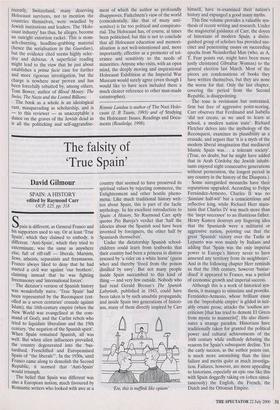The falsity of `True Spain'
David Gilmour
SPAIN: A HISTORY edited by Raymond Carr OUP, £25, pp. 318 Spain is different, as General Franco and his supporters used to say. Or at least 'True Spain', which they claimed to embody, is different. 'Anti-Spain', which they tried to exterminate, was the same as anywhere else, full of riff-raff — liberals, Marxists, Jews, atheists, separatists and freemasons. Franco always liked to deny that he had started a civil war against 'our brothers', claiming instead that he was fighting freemasonry and 'international forces'.
The dictator's version of Spanish history was wonderfully naive. 'True Spain' had been represented by the Reconquest (ext- olled as a seven centuries' crusade against Islam), the 16th-century empire (when the New World was evangelised at the com- mand of God), and the Carlist rebels who tried to liquidate liberalism and the 19th century, 'the negation of the Spanish spirit'. When Spain remained Spanish, all was well. But when alien influences prevailed, the country degenerated into the 'bas- tardised, Frenchified and Europeanised Spain of "the liberals"'. In the 1930s, until Franco came along to demolish the Second Republic, it seemed that 'Anti-Spain' would triumph.
The belief that Spain was different was also a European notion, much favoured by Romantic writers who looked with awe at a country that seemed to have preserved its spiritual values by rejecting commerce, the Enlightenment and other hostile pheno- mena. Like much traditional history writ- ten about Spain, this is part of the facile mythology. In his excellent introduction to Spain: A History, Sir Raymond Carr aptly quotes Pio Baroja's verdict that 'half the idiocies about the Spanish soul have been invented by foreigners, the other half by Spaniards themselves'.
Under the dictatorship Spanish school- children could learn from textbooks that their country had been a princess in distress rescued by 'a rider on a white horse' (guess who) and thereby 'freed from the poison distilled by envy'. But not many people inside Spain succumbed to this kind of thing — and very few outside. Nobody who had read Gerald Brenan's The Spanish Labyrinth, published in 1943, could have been taken in by such unsubtle propaganda; and inside Spain two generations of histori- ans, many of them directly inspired by Carr Ere, this is nuffink like opium' himself, have re-examined their nation's history and expunged a good many myths.
This fine volume provides a valuable syn- thesis of recent writing and research. Under the magisterial guidance of Carr, the doyen of historians of modern Spain, a distin- guished group of scholars has provided suc- cinct and penetrating essays on succeeding epochs from Neanderthal Man (who, as A. T. Fear points out, might have been more justly christened Gibraltar Woman) to the general election last March. Most of the pieces are condensations of books they have written themselves, but they are none the worse for that. Only the last chapter, covering the period from the Second Republic, is disappointing.
The tone is revisionist but restrained, firm but free of aggressive point-scoring. Carr observes that Ferdinand and Isabella `did not create, as we used to learn at school, a modern nation state'. Richard Fletcher delves into the mythology of the Reconquest, examines its plausibility as a crusade, and argues that 'it is a myth of the modern liberal imagination that mediaeval Islamic Spain was. . . a tolerant society'. (True, no doubt, but he might have added that in Arab C6rdoba the Jewish inhabi- tants enjoyed eight consecutive generations without persecution, the longest period in any country in the history of the Diaspora.) Some unregarded monarchs have their reputations upgraded. According to Felipe Fernandez-Armesto, Charles II was no `fainéant half-wit' but a conscientious and reflective king, while Richard Herr main- tains that Charles IV was much more than the 'inept successor' to an illustrious father. Henry Kamen destroys any lingering idea that the Spaniards were a militarist or aggressive nation, pointing out that the great 'Spanish' victory over the Turks at Lepanto was won mainly by Italians and adding that 'Spain was the only imperial power in Europe's history never to have annexed any territory from its neighbours'. And in the following chapter Herr reminds us that the 18th century, however 'bastar- dised' it appeared to Franco, was a period of economic growth and imperial success.
Although this is a work of historical syn- thesis, it manages to stimulate and provoke. Fernandez-Armesto, whose brilliant essay on the 'improbable empire' is gilded in suit- ably ornate prose, attacks the 'soulless art- criticism [that has tried to demote El Greco from mystic to mannerist]'. He also illumi- nates a strange paradox. Historians have traditionally taken for granted the political power and cultural achievements of the 16th century while endlessly debating the reasons for Spain's subsequent decline. Yet the early success, as the author points out, is much more astonishing than the later failure and merits quite as much investiga- tion. Failures, however, are more appealing to historians, especially an epic one like this with Spain doggedly taking on (often simul- taneously) the English, the French, the Dutch and the Ottoman Empire.


























































 Previous page
Previous page